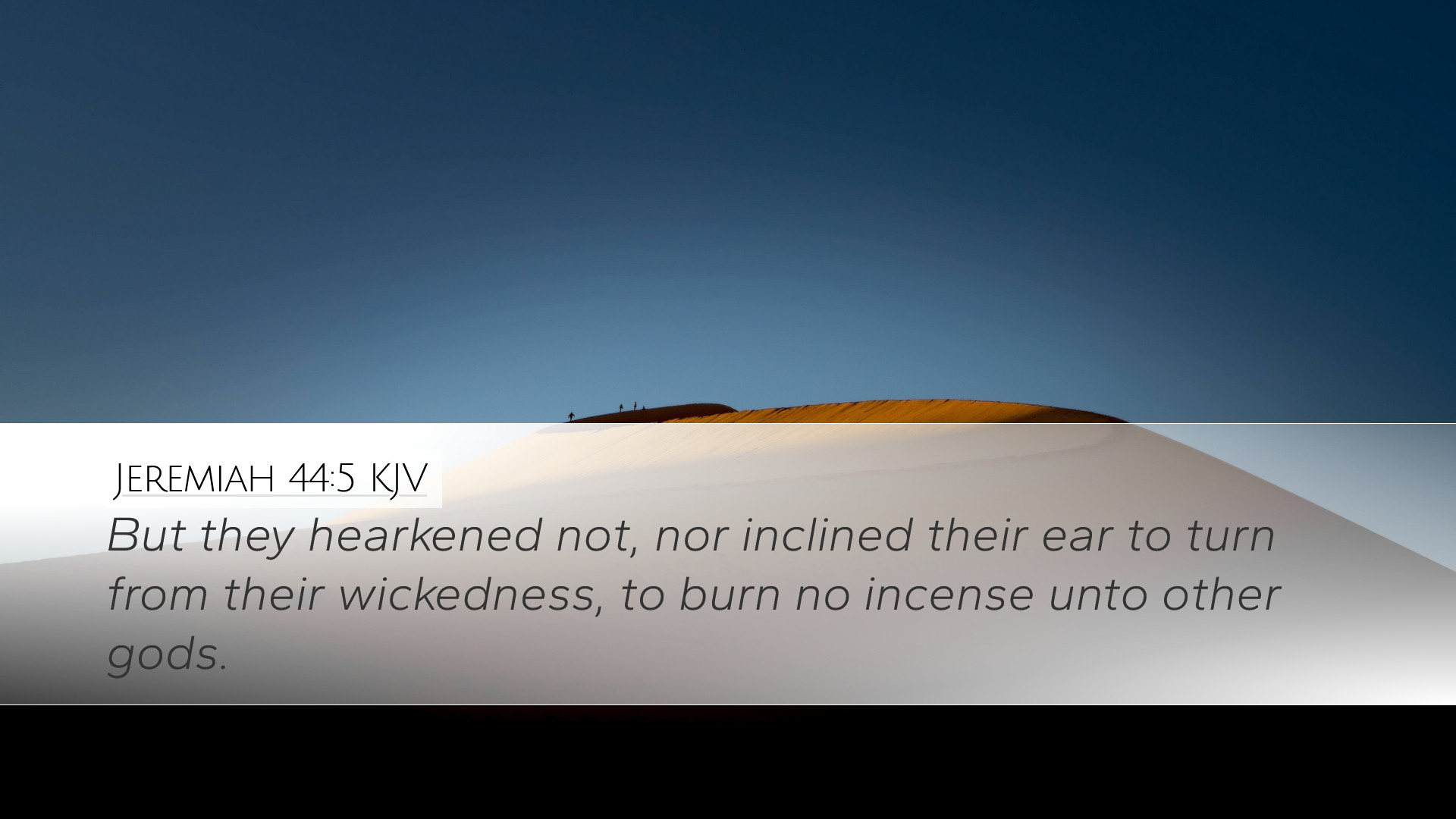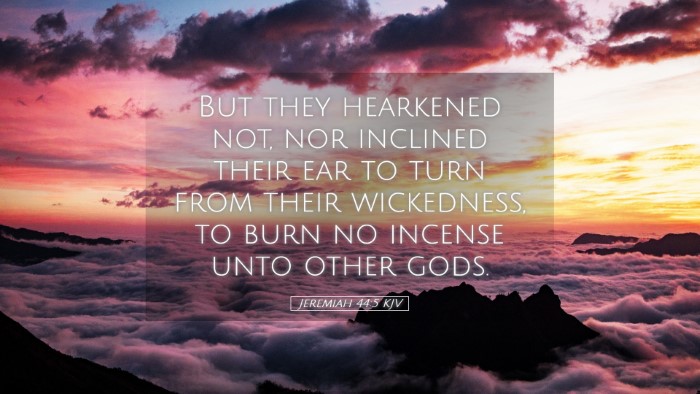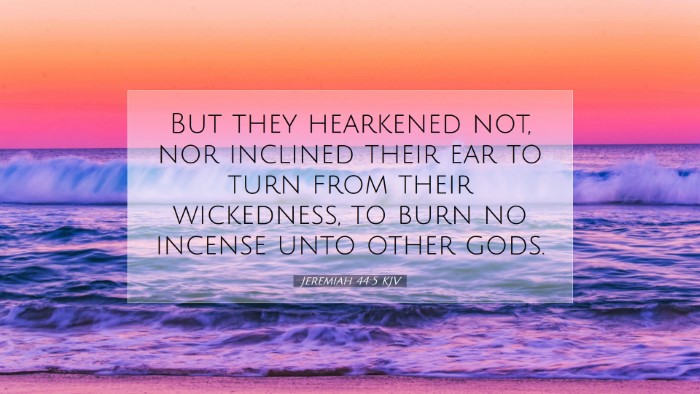Commentary on Jeremiah 44:5
Bible Verse: "But they hearkened not, nor inclined their ear to turn from their wickedness, to burn no incense unto other gods." (Jeremiah 44:5)
Contextual Background
This verse sits within a larger narrative in the Book of Jeremiah, which addresses the idolatrous practices of the people of Judah during a tumultuous period in their history. Following the destruction of Jerusalem, some Jews fled to Egypt, where they continued their worship of foreign gods despite God’s warnings delivered through Jeremiah.
Exegesis
Jeremiah 44:5 captures the essence of the people's obstinacy and their refusal to heed the solemn warnings of the prophet. The phrase "But they hearkened not" emphasizes their rejection of God's communication and guidance. Both sentimentally and theologically, this refusal marks a deepening rebellion against divine authority.
Insights from Public Domain Commentaries
Matthew Henry's Commentary
Matthew Henry expresses the gravity of the people's stubbornness in refusing to renounce their idolatrous ways. He notes that God's repeated warnings through prophets like Jeremiah were met with silence and disregard. In his perspective, this illustrates a broader principle of human nature—an inclination toward rebellion and a desire to indulge in sinful practices despite the repercussions.Henry emphasizes that the refusal to listen to God's voice leads to spiritual desolation and eventual judgment.
Albert Barnes' Notes on the Bible
Barnes expands on the implications of the people's actions by highlighting the theme of willful disobedience. He points out that the phrase "nor inclined their ear" signifies a deliberate choice to remain ignorant of God's commands. Barnes underscores that this unwillingness to listen stems from a hardened heart, one that has grown calloused through repeated disobedience over time.
- Choice to Reject Divine Instruction: The people of Judah actively chose to ignore the prophetic counsel, choosing instead to engage in practices that they were culturally comfortable with.
- Consequence of Idolatry: Their worship of other gods not only grieved God but also led to their spiritual degradation and separation from the blessings that come from obedience.
- Warning Against Spiritual Apathy: Barnes urges readers to consider the dangers of spiritual apathy, reminding us that ignoring God's leading can have dire consequences.
Adam Clarke's Commentary
Clarkes provides a rich theological perspective on this verse. He contends that the refusal to burn incense to other gods, as mentioned in the latter part of the verse, is an act of commercialized spirituality—a symbol of external show devoid of heartfelt sincerity. Clarke emphasizes that true worship cannot coexist with idolatry: “To serve two masters is an impossibility; they wrong one, and defile the other.” Clarke's view serves as a poignant reminder of the divided loyalties often experienced in the hearts of believers.
Theological Implications
This verse serves as a theological reflection on the nature of human free will, the role of divine warning, and the consequences of idolatry. It speaks to pastors, theologians, and scholars interested in understanding the weight of disobedience in the light of God’s grace and judgment:
- Human Freedom and Responsibility: The refusal to obey signifies the gift of free will, which, while allowing for genuine worship, also permits rebellion against God’s wishes.
- Divine Patience and Longsuffering: God's continued communication through prophets reflects His deep desire for reconciliation, even when faced with unyielding hearts.
- Idolatry as a Statement of Heart Condition: This refusal to renounce idolatry reveals the internal struggles between cultural identity and spiritual fidelity.
Practical Applications
For pastors and teachers, this verse is a call to recognize the subtle idolatry that may infiltrate modern worship. Even in a post-Christian world, the temptation to worship cultural values or personal ambitions remains. Emphasizing the importance of listening to God's word, believers are challenged to reflect on their own lives and the gods they may unwittingly serve. Here are some applications:
- Encourage congregants to cultivate spiritual disciplines that foster attentiveness to God's voice.
- Address cultural idols that may distract from authentic worship and influence personal and corporate devotion.
- Emphasize the importance of repentance and turning back to God, providing a framework for understanding grace amidst their failures.
Conclusion
Jeremiah 44:5 starkly presents the challenge of adherence to God amidst the diverse pulls of idolatry and cultural influences. By combining insights from Matthew Henry, Albert Barnes, and Adam Clarke, it can be seen that the refusal to heed divine instruction carries serious implications, not only for those in the time of Jeremiah but for contemporary believers as well. The persistent invitation God extends to His people to turn from their wickedness remains a cornerstone of hope and a critical call to action today.


